Creating Brave Spaces
B Adair speaks on improving DEI in a rural community
By Bryan C.K. Hansen
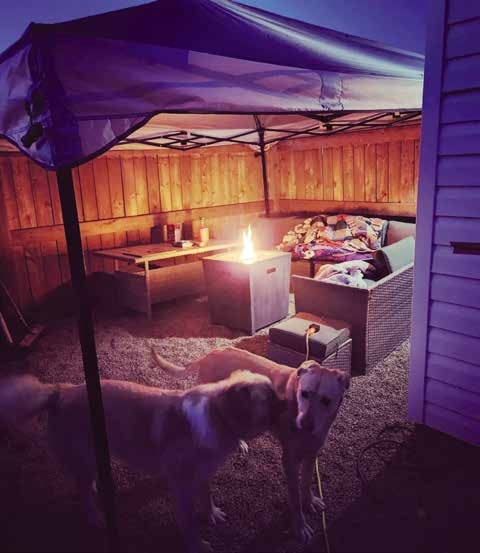
The “B-Hive” – acomfy place in B’s backyard perfect for late-night work sessions.
Diversity, equity and inclusion (DEI) has quickly become an everyday part of mainstream corporate dialogue within the last few years. Diversity can be explained as differences within a given work setting. Equity ensures that programs and processes are fair and impartial and provide equitable outcomes for every individual, while inclusion is the practice of ensuring that every individual feels a sense of belonging in their workplace.
B Adair is a Canadian Certified Inclusion Professional and founded his organization, Just B Diversity and Inclusion Consulting, located, according to Adair, “in the middle of nowhere, an hour east of Red Deer, Alberta. The entire reason for getting started was that nobody else was doing it, and there were no other options available to people in this kind of rural area.”
Adair is a retired paramedic and a transgender person who has had horrific health-care experiences. Due to these experiences, he got involved with patient experience and advisory groups across Alberta. “I just realized there was so much more inequity that I didn’t know about, and [I] had no idea what was going on,” says Adair. “I’m a giant nerd. I started learning all I could and then [started] talking about it. A few folks wanted to hear, but most didn’t.”
However, Adair didn’t let this initial apathy set him back. “This kind of lack of information is relatable to folks in places like rural Alberta,” he says. “I come from a place where I hadn’t heard the word transgender until I was almost 30. [Having] that piece of identity come into existence puts me in a place to help others.”
A big part of helping others, according to Adair, is “creating a comfortable space to have uncomfortable conversations, which is my primary philosophy.” Within these spaces, Adair says, “People are welcome to ask questions, and it’s okay if you don’t know the right words or how to say it. I create spaces to find better words and perhaps more thoughtful ways to ask questions – or, in some cases, maybe recommend not asking those questions at all.”
Just B Diversity and Inclusion got its start with Adair’s personal connection to the DEI sector. “It unofficially started when I was 30 and struggling with PTSD from working as a first responder,” explains Adair. “Part of working through that trauma was writing and publishing anonymously on a website. I was interacting with one person in particular from New York City, and they eventually asked me if I was possibly transgender.”
This conversation led Adair to have several thoughts: “Who am I? Can I transition? Nobody around me has even heard of this. I could lose my safety, my job, my family and my friends.” That online correspondent was Alix, who is now Adair’s partner. They have been married for eight years and now live together in rural Alberta.
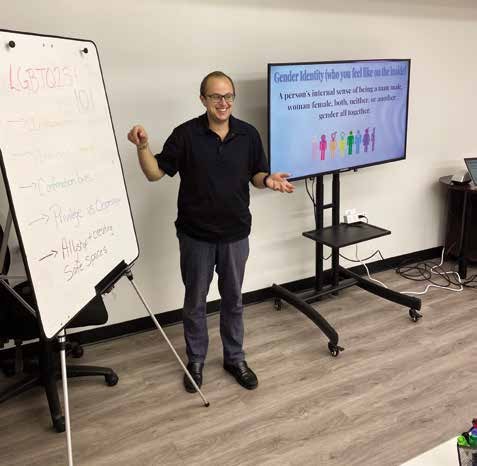
B hosting a SOGIE (sexual orientation, gender identity & expression) presentation.
When it comes to some common workplace improvements for DEI policies, Adair is quick to provide input. “Policyspecific language is a big one. I have two- or three-hour workshops where we just talk about language,” he explains. “It’s important that all employees know DEI policies exist, and how to submit a complaint or a concern. If it’s known that a manager will have to address a complaint, it really does remove a lot of barriers.”
DEI policies can also be a positive factor in attracting and retaining gender and sexually diverse talent in a workplace. “When someone is looking for a job, they’ll look at [the company’s] website and social media – that’s a huge factor,” explains Adair. “When you have public statements that say you respect and protect folks from discrimination based on all protected grounds, you know it’s on their radar and they’ll do something about it.”
A company’s implementation of DEI policies is a mutually beneficial circumstance, Adair explains. “When you see a company that states they hire folks for lived experience, you know they understand that a diverse team is more creative, and you’re going to improve everything in your organization.”
Adair’s company now works in multiple industries across Canada and has seen a recent boom in business due to people appreciating a different perspective. “I’m primarily asked to offer [DEI] training and education sessions,” says Adair.
Due to the pandemic, Adair has primarily been providing services online for the last few years; however, Adair says, “I’ve been getting back into a few in-person workshops, where my focus is always creating a brave space to have conversations. I don’t just speak at you – it’s interactive, reflective and allows folks to see how this applies at work, at school or at home.”
When it comes to some of his proudest accomplishments, being part of a supportive network for the SOGIE (sexual orientation, gender identity & expression) community tops Adair’s list. “I’ve developed a reputation in a rural area as someone safe to talk to,” explains Adair. “I do a lot of work with kids and mental health. I get regular calls and messages about kids who get kicked out of their home because they just came out. Realizing I’m even on that call list is incredible. I didn’t have that growing up, so my goal is to be that person who wasn’t here before.”
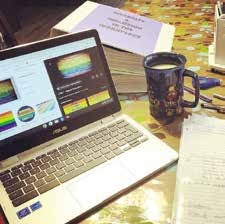
B’s laptop and mug of tea.

B worked for the Blue Jays this year as a DEI virtual facilitator, so a Blue Jays game acts as another version of his office.
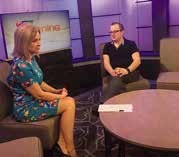
Interview with CTV on mental health advocacy in rural Alberta.
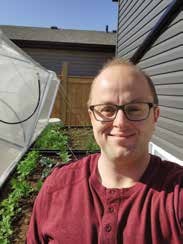
B in the sunshine in front of his garden beds.